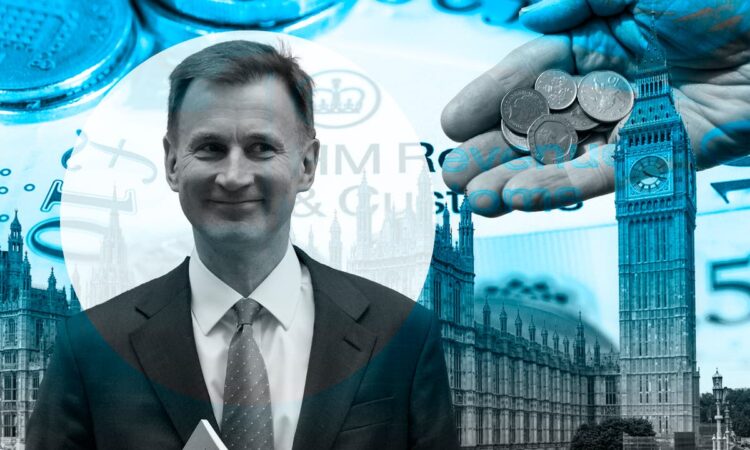
Jeremy Hunt has unveiled a crackdown on benefits and tax cuts in his first autumn statement as Rishi Sunak’s chancellor.
Insisting that the economy is “back on track” after inflation fell below 5 per cent, Mr Hunt told the Commons on Wednesday he was introducing “110 different measures to help grow the British economy”.
Speaking with an eye on next year’s election, the chancellor extended an £11bn-a-year tax break for businesses and offered a 2 per cent national insurance cut – as he also sought to push people with mobility issues and mental health issues to work from home or face having their benefits cut.
Chancellor of the Exchequer Jeremy Hunt leaves 11 Downing Street to deliver his autumn statement
( Stefan Rousseau/PA)
The chancellor is one of the UK’s wealthiest politicians, and The Independent has taken a look at how he amassed his own personal fortune and his path to No 11.
A long-time health secretary, Mr Hunt, 56, made an unexpected return to the Westminster spotlight last October when he was drafted in by flailing PM Liz Truss.
He replaced Kwasi Kwarteng in No 11 following the debacle of their tax-slashing, uncosted “mini-Budget”, which sent the markets into turmoil and the pound plummeting against the dollar and forced the Bank of England to intervene to prop up pension funds.
His appointment was a last-ditch and ultimately doomed attempt by Ms Truss to prop up her disastrous administration.
When it failed, Mr Sunak, whom she had defeated in the summer party leadership race to succeed Boris Johnson, was swiftly ushered into Downing Street to restore order with Mr Hunt at his side.
Mr Hunt is one of UK’s richest politicians
(Getty Images)
The chancellor duly delivered a much more sober, not to say austere, autumn statement in November in which he introduced a package of tax rises worth £24bn and spending cuts of £30bn in order to plug a massive funding black hole in Treasury coffers and reassure the global financial markets that Britain remained a trusted trading partner.
Prior to his career in parliament, which began with his election as the Tory MP for South West Surrey in 2005, Mr Hunt attended Charterhouse School in Godalming and received a first-class degree in philosophy, politics and economics at Oxford before working as an English teacher in Japan.
In 1991, aged 25, he co-founded Hotcourses, an educational listings publisher, with childhood friend Mike Elms.
The business provided a database of opportunities in higher education in the UK for prospective overseas students and was sold to Australian student placement company IDP Education in 2017 for £30.1m.
Mr Hunt had stepped down as a director in 2009 prior to his first shadow cabinet appointment but retained, according to Companies House records, a 48 per cent stake in the business, netting him a reported £14.1m, making him one of the UK’s richest politicians.
He has said he will use the money to fund campaigns after he leaves politics.
Mr Hunt in former leader David Cameron’s cabinet in 2012
(Getty)
That accounts for the bulk of his fortune, while his annual salary as an MP stands at £84,144.
Having served as culture secretary, health secretary and foreign secretary between 2010 and 2019, he will have picked up ministerial salaries in line with those roles. These will have changed over time but included an entitled salary of £71,090 and a claimed salary of £67,505 in 2019, according to government records.
As chancellor of the exchequer, he is paid the same as a secretary of state, with an entitled salary listed at £72,454 and a claimed salary at £67,505.
In addition, the Parliamentary Register of Interests records that Mr Hunt owns a portfolio of shares held in a blind trust, as well as a half-share of a holiday house in Italy and a half-share of an office building in London.
Mr Hunt also jointly owns Mare Pond Properties Ltd, a holding company, with his wife Lucia, which owns seven apartments in Southampton.
The register further records that, in 2022, he was hired by several companies to speak at events for fees ranging from £4,000 to £12,000, although in each case the money was paid directly to charity.






